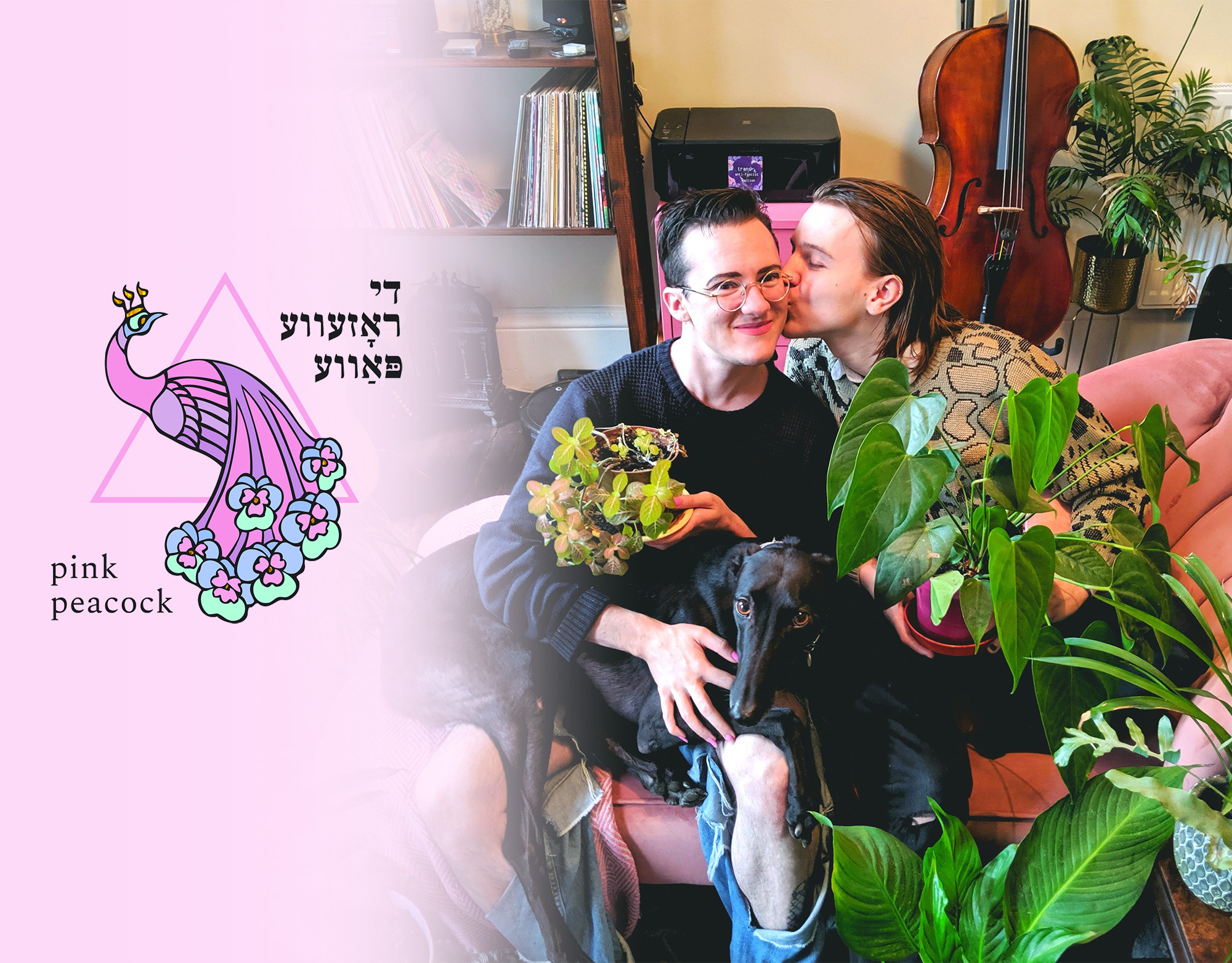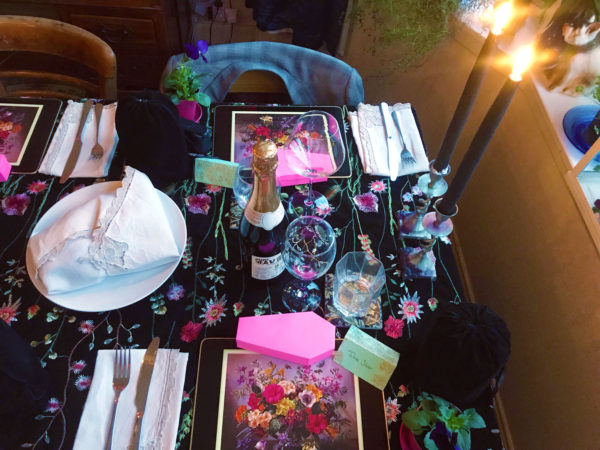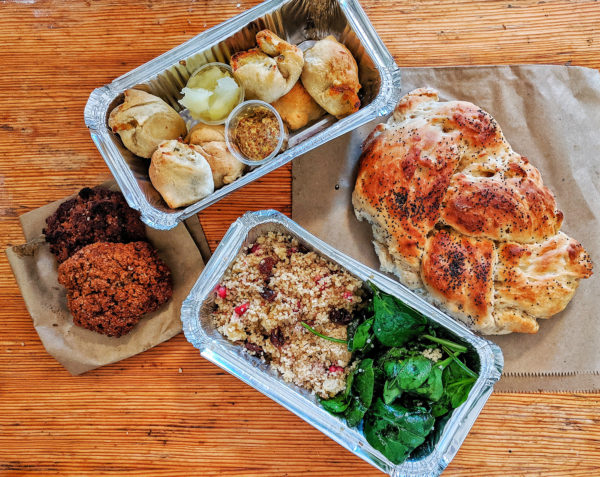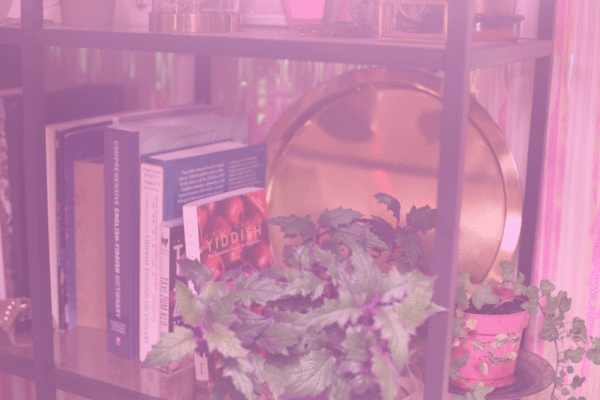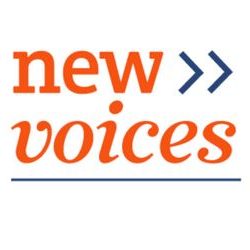In the diasporic corners of Jewish Glasgow, Scotland, the new Yiddish, anarchist café “Pink Peacock” or די ראָזעווע פּאַווע is the latest bastion of a worldwide queer Yiddish revival. A vegan, kosher, pay-what-you-can spot for language learning and community building, Pink Peacock sets a table for hospitality, history, and solidarity. In a conversation from two digital sides of the pond, New Voices Editor in Chief Rena Yehuda Newman sat down with the cafe’s two creators to discuss Yiddish revival, queer Jewish identity, and how to make the revolution delicious.
Morgan: I’m Morgan Holleb. My pronouns are he/him and I’m a Jewish anarchist. I’m American, but I’ve been living in the UK for 13 years and I’ve been in Glasgow for the last three years.
Joe: I’m Joe Isaac, my pronouns are he/him as well. I’m from Huddersfield in Yorkshire. From a quite rural part of Yorkshire.
Rena Yehuda: Where did the name “pink peacock” come from?
Morgan: A symbol of Yiddish literature is di goldene pave, the golden peacock. So we went for pink peacock because of “gay”. That’s it. That’s the story.
Rena Yehuda: So, what is the pink peacock all about?
Morgan: pink peacock is a queer, yiddish, anarchist cafe opening in Glasgow, Scotland. We have been working on it for about a year but we started in March when quarantine hit. We were planning on finding a physical space when the pandemic started, but we pivoted to respond to the community while everybody’s inside. There are people who can’t leave the house, so we bring them food; nice homemade vegan Jewish foods that they couldn’t get even if it could go outside because there isn’t a Jewish bakery anywhere nearby. We baked challah and bagels and we made hummus and like, jeweled couscous and cookies and knishes and all kinds of nice, filling, wholesome Jewish foods. We delivered them in our local area of Govanhill in Glasgow, on the south side.
We use the “pay what you can” model, and we’ve had such a wonderful response to that. We weren’t sure if that was going to work, but we wanted to try it. We definitely had people who didn’t pay us anything. We just gave them food for free. Then we had people who paid us much more than they needed to and it’s worked. We think it’s genuinely sustainable. We believe in bringing luxury food to everybody regardless of their income, using a “solidarity, not charity” ethos. It’s really important to us that people can pay at any price point and have dignity and anonymity.
Rena Yehuda: What’s the relationship between the cafe and the local Jewish community?
Morgan: Since moving to Glasgow we’ve made connections with a local Jewish and diaspora-positive anarchist community, who are overwhelmingly queer as well. But the thing that unites us is our politics and our flexible practices. We’re quite a diverse group in terms of our traditions and how frum people are and the ways that people observe. So that’s been really lovely and really welcoming. But there is no space for us to organize outside of our living rooms and there is no shul that feels comfortable for us.
Joe: I didn’t grow up with any real Jewish context. I heard rumors of Jewishness in my family, but it was more fun trivia. Because it was on my dad’s side and because of our limited understanding of Jewishness, we just assumed we have no claim to it. Until I met you [Morgan]. There was all this Scottish Jewish anarchist stuff happening, and you were there for that starting up. You were wanting to host these shuls in the flat we were living in and you were very good at being like, “You can come to this if you would like to.” That was a great way to learn about Jewishness. Having a complicated identity or complicated relationship to if you’re Jewish “enough”, it’s just inherent to it. That was the first thing I learned.
Morgan: There’s no Jew who doesn’t wrestle with questions of authenticity. We started our own shul that operated out of our living rooms. Eventually we moved into a DIY space called Glasgow Autonomous Space. But then we had to move back into our living rooms because it was too cold in the wintertime. In quarantine we’ve been doing a groupchat online. There’s an obvious need across the whole UK for loudly queer Jewish work.
Rena Yehuda: Why do you think that is?
Morgan: We’re trying to address barriers to Jewish community. Joe, you’re patrilineal. I’ve not had a bar mitzvah of any kind. Neither of us had traditional Jewish educations. We both grew up in secular households. We did a tweet earlier about the three biggest barriers to access to Jewish community that, in our experience, are (1) fear of rejection — that you don’t know enough and that you’re not Jewish enough and experience this imposter syndrome, that’s the biggest one — (2) the expectation of discrimination around queerness, race, or other identities. Then (3) is the discomfort with Zionism and Israel. The third might be the lesser of them; most people that we’ve talked to could hold their nose about Israel if it meant participating in the Jewish community that was otherwise comfortable. But people are so weird about queer stuff and about race.
Joe: We phrase that quite personally in terms of it being the expectation, because a lot of times you might have shuls that say that “queer is welcome”, but if you’re not instilling some kind of confidence in me as a queer person that you’re not going to enforce gender et cetera, I’m not comfortable there. That’s the main thought process for a lot of our friends.
Rena Yehuda: Jewish community should so much feel like coming home. It feels like Jewish community should be the one place where you shouldn’t have to feel that type of discomfort.
Morgan: There are so many other barriers that make people nervous, too. If they don’t meet whatever kind of rigorous standards of Jewishness, or if they’re converts, or if they’re not white, or if their tradition isn’t Ashkenazi. It’s very important to us with this cafe that we are explicitly welcoming to all of these different groups. There needs to be more behind that commitment than just some words. We’re already working with—in different ways—with a fair number of other community groups because as anarchists like we believe that building solidarity with other groups is absolutely crucial.
We’re working with an interfaith food justice group and another group called the National Food Service. We are also working with minority language activists, especially in Gaelic but we’re looking to do that with others as well, because we know that some of the challenges that Yiddish faces are unique, but mostly preservation and production are common problems with other languages too. We’re part of a tenant’s union; housing activism is really important to us. Govanhill has the largest like migrant population in Scotland. It’s also the most ethnically diverse part of Scotland. It’s important to us to be genuinely welcoming to people who speak other languages and to people from other places, many of whom are refugees or asylum seekers, or are undocumented.
Joe: In a lot of ways it’s become a necessity for us. Those are our neighbors.
Morgan: Govanhill is also undergoing gentrification right now and we’re trying to do everything we can to fight that. From the perspective of the cafe, having the “pay what you can” model is really important because that will give people a place to socialize and to organize community without the expectation that they spend even a penny; they can just hang out. The business model for most cafes in big cities is that like, all of the surfaces are hard and it’s noisy. It’s an unpleasant place because they want you to leave really quickly and have a high turnover because that’s better for their budget. We want the opposite of that. Like, we’re going to have lots of like soft furnishings and people can just fucking loiter.
Rena Yehuda: Earlier in this conversation, Morgan had mentioned the notion of “solidarity, not charity.” What does that mean to you?
Joe: We are working with people to make the thing that we both want, if that makes sense. We and our community both want this thing to exist, so it’s not charity on anyone’s behalf there. It’s solidarity to create this thing that is mutually beneficial to us.
Morgan: I’m against charity. Charity is a really paternalistic model. It relies on a capitalistic model, on the philanthropic benevolence of rich people. That’s a terrible way to structure community building. So for us this isn’t an act of charity but rather me feeding you is an act of self preservation on my part because I need you. That makes our communities richer. You will have work that you do, even if it’s something that I don’t understand or necessarily directly value. You’re important to your loved ones, your family, your friends. And so I care about you surviving. So me feeding you is good for me because it’s good for everybody. We recognize that our liberation is bound up together.
Rena Yehuda: As you’re speaking, I’m thinking about the etymology of the word “charity” which comes from Greek and became part of a Christian understanding of what it means to help other people, a kind of altruism or self-sacrifice. In contrast, the Jewish concept of tzedakah, meaning “justice”, is a type of obligated giving that we have in our tradition. Do you see tzedakah relating to the work of your café?
Morgan: Tzedekah is an act of solidarity. That’s how I’ve always viewed it.
Joe: It works as a reminder to do some mutual aid. If I was to change any part of tzedekah, I would update to the idea that it wouldn’t be 10%, but it would be relative to income and expenses. People are so uncomfortable talking about money. One of the most unhelpful ways that manifests is that it becomes hard to receive mutually aid. As you said, there’s an obligation to mutual aid, but there’s also an obligation to receive mutual aid. It sounds weird, but the model doesn’t function unless both people participate.
Morgan: There’s lots of Jewish precedents like in our texts about this, right? There’s the Jubilee, where the land is redistributed every 50 years and all debts are erased. At all times you leave some of your crop unharvested for like the widows and the orphans or the wanderers or whoever it is that needs food. There’s this very Jewish history of feeding people. The other thing pink peacock is doing to combat a toxic culture of not talking about money is making our budget spreadsheets public. You can see exactly how much money we take in and where we spend it. That helps us not only be accountable to the community, but also show people that this kind of project is possible.
Our food is free for anyone who needs it, you don’t need to “pay it forward”. But that’s too abstract for people. People say to us, I want to buy a meal for someone poor. And we say, well, can you pay for our electricity bill? Because like we need the lights on in order to feed people. People are always asking, “How many meals will this buy for someone?” It feels like they want us to take a picture of like a smiling poor person with a plate in front of them and go like, “Look, you paid for this.” We’re not gonna do that. That’s weird and fetishistic and invasive and creepy.
Rena Yehuda: It seems like there’s this revival of Yiddish culture happening across the diaspora. What’s the connection for both of you, between queerness and Yiddish?
Joe: I think it comes back to a pretty simple answer, which is just that these different groups complement each other incredibly well, for different, more complex reasons. We are queer and Yiddish encapsulates a lot of our identity, contains politics that we like. They’re complimentary and therefore people have come to them quite naturally.
Morgan: I think there’s a risk of assigning a political label to an entire language and we shouldn’t do that. But, Yiddish is definitely perceived as being a lefty language in opposition to Hebrew, which is perceived as being a Zionist language. For leftist Jews and queer Jews, the Jewish establishment doesn’t have space for us. Jewish education doesn’t talk about our histories. It talks about mostly Zionism and Jewish tragedy, and most of the time not in a way that’s very empowering. There’s no talk about Jewish anarchists, even though anarchism is inherently extremely Jewish; anarchism wouldn’t exist in the way that it does if it weren’t for Jewish theorists and anarchists. At best you’ll hear about the Bund, who are very interesting, but they’re not anarchists, they’re socialists. You’ll hear about Zionist activists on the left. But there’s a really, really incredibly rich Jewish leftist history from the 19th and 20th century that gets totally obscured by most Jewish education and further erased by like Jewish institutions.
Joe: The same people participating in this revival are also realizing that we now benefit less from assimilation.
Morgan: Compared to our parents and our grandparents, who really stood to economically and socially benefit from assimilation, Millennial and Zoomer Jews don’t. For some people, being visibly Jewish is not viable for them for safety reasons. But for many others, we are downwardly economically mobile right now. We’re in the second recession of our adult lives and it’s the worst one ever. There’s looming climate catastrophe. The reasons for assimilation aren’t present in the way they were for our parents and grandparents. All that we stand to gain from assimilation is cultural loss.
Especially as white Jews realize the harms and the violence of white supremacy and whiteness, we want to de-assimilate from that and actively be traitors to whiteness and fight with our comrades who aren’t white. The interest in Yiddish from secular Jews, the renewed interest in Jewish anarchism, and the renewed interest in Jewish practice are all bound up together because we’re realizing assimilation doesn’t help us.
There’s an interesting relationship between Jewish anarchism and anti-religious Jewishness. We had a Yom Kippur ball last year that was really fun. But it ruffled some feathers. Our Jewish heritage is anarchism. Though Jewish anarchism has historically been anti-religious, for us it’s more atheistic — not anti-religious.
Rena Yehuda: Yiddish is such a historical language; what’s it like for you to speak it today?
Morgan: There’s a lot of stuff in queer Yiddish circles we’re grappling with now, like how do we talk about queer issues in Yiddish? How do we talk about disability? How do we talk about race? There’s not a good vocabulary readily available. Many words about any of those topics are actually slurs in Yiddish. The same as well for like gendered and sexual violence.
Joe: Institutional Yiddish is very resistant to change, even in ways which would be considered natural for other languages.
Morgan: There’s a real fear of the corruption of Yiddish. There’s a real fear of that loss, which is obviously due to our trauma as Jews. But with the pink peacock, we want to encourage Yiddish learning. We encourage participation in Yiddish before people are fluent. We want to give people confidence to practice and to mess up and for that to be fine.
The price of classes makes for very few places to learn Yiddish that are accessible, so we’re hoping to have Yiddish language resources in the cafe. If we have other Jewish languages, that’d be brilliant as well. The Yiddish that we use is not perfect because we’re not native speakers and we’re not fluent. We make mistakes on Twitter all the time and often people will correct us and we always thank them. We’re learning and being really public about it. But also, it is our ancestral language, we are entitled to it, we have a claim to it, and it’s ours to fuck up. We do value the language and don’t think it’s ours to bastardize, but we’ve had people tell us our Yiddish isn’t good enough to use. We have to say, well…that’s your opinion.
Rena Yehuda: What’s the dream for this cafe like going forward? You ran a very successful crowdfunding campaign. What’s the dream for the pink peacock as it stands now?
Joe: We’d like more events, we’d like community groups, more language preservation. We want to make sure that food is kept free for those who need it, and we want to increase the amount of staff with local workers. We’re registered as a community interest company, which means that as directors, we don’t own any shares or assets of the company. As an anarchist space, we’re planning on all of our workers also being directors on the board, which means that they will have an equal say in the operations and equal pay to us. We also don’t want to work on Shabbos, so we’ve got to get some Shabbos goys.
Rena Yehuda: What would like for New Voices readers to know about you and what’s coming up for the pink peacock?
Joe: It’s been our intent the whole time to be an online diaspora community which means at the moment, hosting our digital Havdalahs and Crusin’ for a Shmeusen’ events.
Morgan: We’d mostly like your American readers to know that we are really interested in connecting with other diaspora Jews. Even after quarantine and the virus, we’re planning on being very online and live-streaming our events. ⋄
Learn more about the pink peacock by visiting the cafe’s website and get connected to their virtual events here. You can follow them on Instagram @dirozevepave or on Twitter. Featured photo by @bigsadfriend (Twitter). All other photos provided by the pink peacock.
